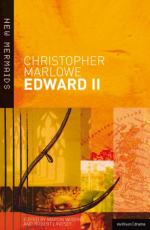|
This section contains 414 words (approx. 2 pages at 400 words per page) |

|
In this brief essay, Johnson focuses on the theme of music in Marlowe's play, particularly as it applies to the dialogue.
Gaveston's speech reflects the medieval and Renaissance conception of the power of music, which was thought to be capable of inducing specific psychological effects (see James Hutton, "Some English Poems in Praise of Music," English Miscellany, II [1951], 1-63, and the exchange of letter between Hutton and the present author, "Spenser's Shepherds' Calendar," TLS, March 30 [p. 197], May 11 [p. 293], and Sept. 7 [p. 565], 1951). Gaveston does not wish to retain the poor men who have just sued to enter his service; instead, in order to maintain his power over Edward, he will employ poets and musicians to stir Edward's less kingly desires. The pliancy of Edward accords with his unsympathetic characterization in the first half of the play, and his first "musical" image (of the noise of the Cyclops' forge...
|
This section contains 414 words (approx. 2 pages at 400 words per page) |

|




